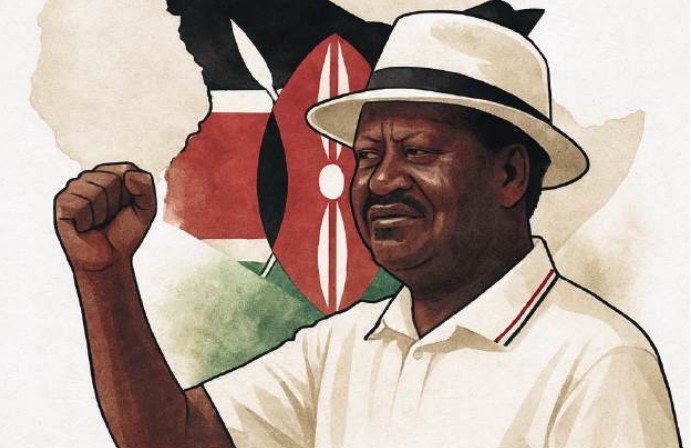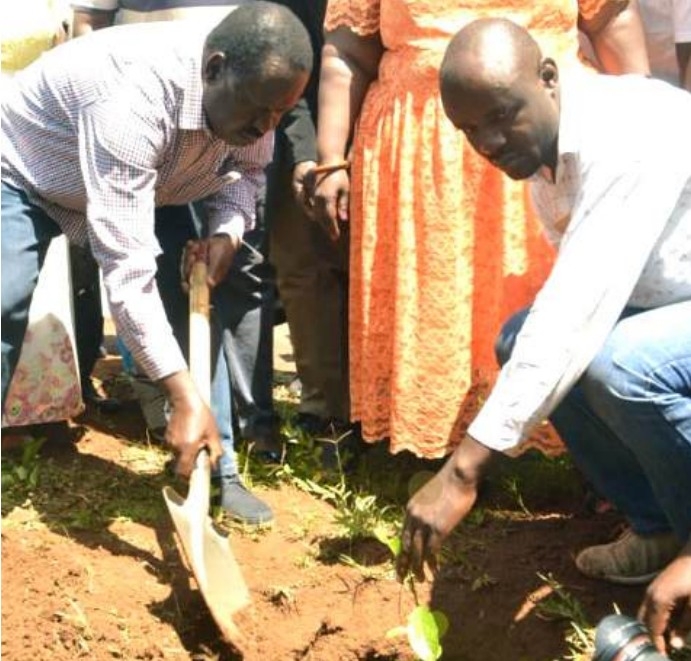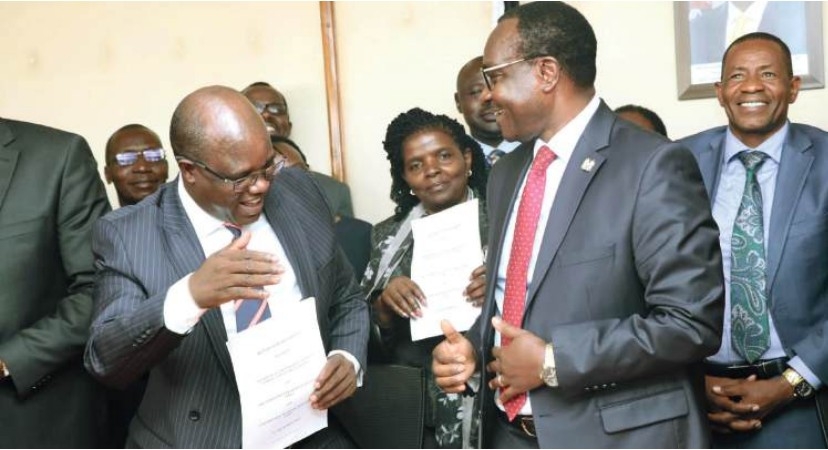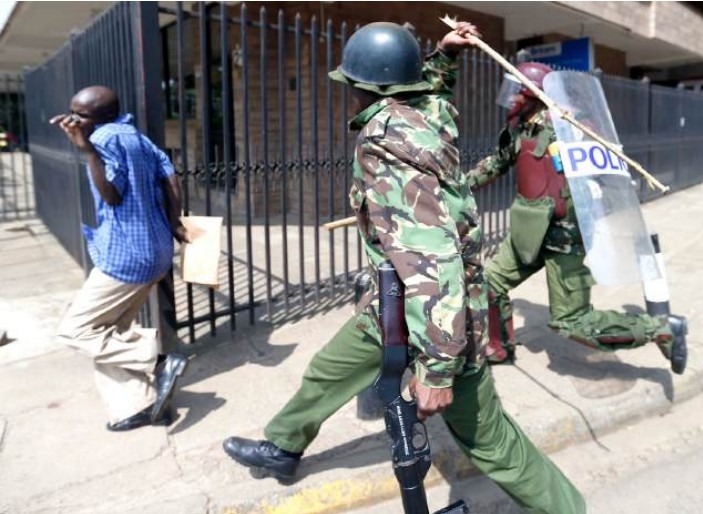It had rained heavily the previous night, and the black cotton mud on the ground was fizzling with every step.
The stench from Ruai sewerage plant a few metres away choked the air. Young men carrying stones from a building site breathed heavily, struggling to keep their gumboots from slithering the mess.
The real mess was, however, all on the residents’ faces - anger, gloom, frustration and hopelessness.
Said Rashid’s wife dragged her feet slowly towards her husband who was standing by a cart packed with a mattress, solar panel, water containers and other household items.
She held her overflowing dress with the left hand so that it was not drenched in mud while maintaining her balance with the right hand.
“Surely what kind of nonsense is this? Why is it always that when two bulls are fighting, it is the grass that suffers? Now with the coronavirus where do they expect us to get money to pay for transportation? How can people be so cruel?” she asked after sitting on a jerrican. She punctuated the questions with several clicks.
Rashid had bought six plots in the area in 2016 and had started digging the foundation for a cosy home he would retire to.
“This has always been the place I come to when I am sick of the hustle and bustle of the city. It is far away from town, very quiet and peaceful,” he reminisced.
On Sunday, the area chief broke the peace by asking the residents to pack their belongings and bring down their houses as the government was reclaiming the land, which decades ago had been reserved for a sewerage treatment plant.
“The chief came with police officers and gave us 72 hours to clear the area, otherwise the government would bulldoze everything down,” he said.
On Monday, a number of tractors were brought to the site, sending the residents into panic. An excavator was already digging a trench across the road that led to the estate.
“We are saving what we can, leaving the rest. It is raining, we are broke having been at home to avoid contracting Covid-19. We cannot manage to take everything away,” Rashid said.
His more than Sh4 million investment was disappearing as he watched. But he counted himself lucky - he has a house in Kibera where he was moving to.
Stephen Owino got his plot in 2012. Until then he lived in Mathare.
“They were expanding Mathare Primary School, so those who were affected by the expansion were relocated here. We only paid Sh3,000 for registration,” Owino said.
He put up a house worth Sh400,000 on the plot.
“I have a wife and three daughters. I have rented a one-bedroom house to relocate to,” he said.
Mary Otieno intended to move into a house she had just completed this month.
She had bought two plots for Sh600,000 and spent Sh1.8 million on the house.
“Last week, my neighbour called to say there were demolitions. Why didn’t they give us enough time to relocate? I have built my house with loans and now all that is gone,” she said as she supervised its demolition.
There are those with nowhere to go. They include 2007-08 post-election violence victims and Mathare residents who, like Owino, were moved out to give way for the expansion of Mathare Primary School.
Mary Wanjiku, 70, arrived from Timboroa as a post-election violence victim. She had her three children had hitchhiked in lorries ferrying goods to Nairobi. They were settled at a camp in Mathare slums.
Four months later, the government moved them to the sewage area in Ruai. All was well until the order requiring them to move came last week.
“The chief came here asking us to move out, but where would we go? We left nothing but death in Timboroa - blood and evil. Our properties were looted, houses burnt, people butchered. What would we return to?” she asked tearfully.
Wanjiku and her children had nothing but the clothes on their bodies when they arrived in Ruai. The place was a bush, inhabited by wild animals.
“We cleared the bushes and using old pieces of clothes and carton boxes, we built a place where we all slept in a crowd, keeping together for safety and warmth,” she recalled, occasionally wiping tears from her sunken eyes with her wrap.
Several months later, Wanjiku said families began buying materials and built makeshift houses.
“Some of us earned money by washing clothes for people in nearby estates. Others collected plastics which they sold to recycling plants. We spent some of the returns on food and other needs and saved the rest to build structures,” she said.
Soon, every family had a place to live in. More land was cleared for settlement.
Their bliss was short-lived. Heavy rains flooded the area and sewerage and filthy water spread on their new-found home. They had to move.
“The Kenya Red Cross came to our aid and moved us to Ruai Primary School where we stayed for eight months before we came back here, starting all over again,” she said.
Ruth Waithera is another internally displaced person. She has five children, all born in Ruai. Her last born is only four months old. She had nowhere to go.
“I’ll just sit here and wait for the bulldozers. When they are done and gone, we'll return, build and wait for them to come back,” Waithera said.
On Wednesday last week, the government moved to recover the land grabbed from the Dandora Estate Waste Sewerage Treatment Plant in Ruai.
Water PS Joseph Irungu and his Lands and Physical Planning counterpart Nicholas Muraguri said the plant is the only wastewater treatment plant for the city. The first phase was done in 1975.
The repossession of the Ruai land came as the Water ministry strains to handle sewerage and water supply needs of the 9.3 million residents of the Nairobi Metropolitan Area.
Only 50 per cent of Nairobi has sewerage coverage. Most of the water sources, rivers and the environment are polluted, endangering both the ecosystem and residents.
The 1,796.5 hectares (4,439 acres) had been set aside for the expansion of water and sewerage facilities to serve the 4.4 million Nairobi residents.
Unfortunately, most of this land (equivalent to 2,500 football fields) is now in the hands of ‘ghosts’ going by the title private developers.
Through the decades, the private developers and squatters have over the years encroached on the property, leaving only 38.6 per cent for sewerage treatment. The government had to recover its property.
- mwaniki FM
















![[PHOTOS] How ODM@20 dinner went down](/_next/image?url=https%3A%2F%2Fcdn.radioafrica.digital%2Fimage%2F2025%2F11%2F99d04439-7d94-4ec5-8e18-899441a55b21.jpg&w=3840&q=100)
